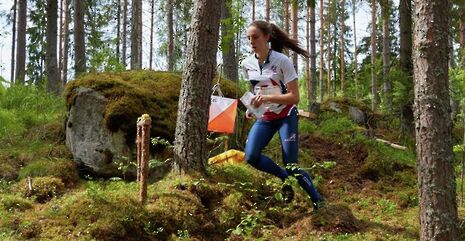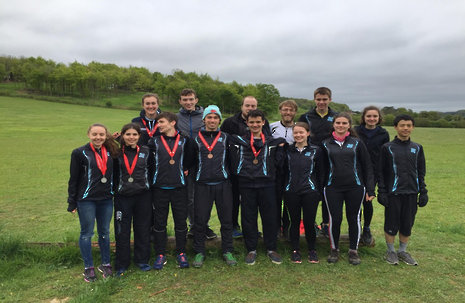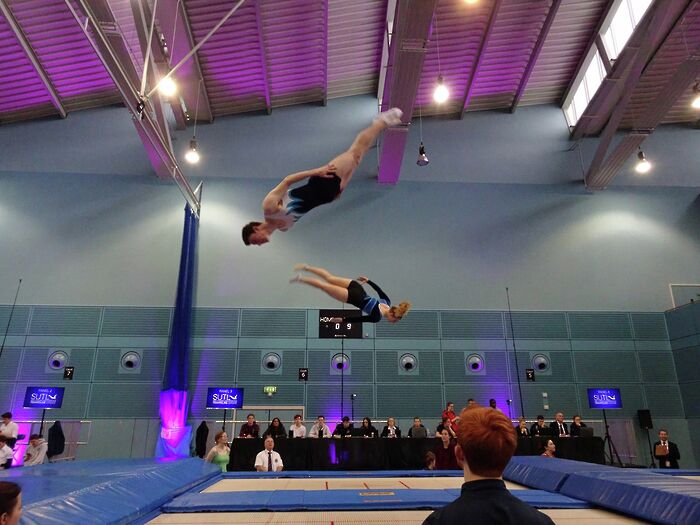New to a Blue: finding your way with Cambridge University Orienteering Club
Marcus McCabe spoke to CUOC Women’s captain Fiona Bunn on how to orient oneself within the world of orienteering

Cambridge University Orienteering Club has been running, map in hand, since 1970, making it 48 years old. And in recent years it has gone from strength to strength, awarded “University Club of the Year” by the British Orienteering Federation in 2017. But, Varsity asks CUOC Women’s captain Fiona Bunn, what exactly is it?
“Orienteering is a running-based sport often described as ‘cross-country with a map’. Races are usually in a time-trial format, and athletes must complete the course on their map in the fastest possible time by visiting the checkpoints in order, navigating the best route between each. Electronic timing chips register as you pass each checkpoint, and special detailed maps are used (normally at a 1:10000 scale). The terrain can be extremely varied; from forest to open moorland, mountains to complex sand dunes.” The sub-discipline, Sprint or Urban Orienteering, takes place in city centres and University campuses - the perfect preparation should you ever need to locate an as yet uncharted lecture theatre.
“I’m motivated, like many others, by the aim of having a perfect run: there is always something that I could do better and improve on which keeps me coming back for more!”
Originating in Sweden towards the end of the 19th century, Fiona explains that initially the sport “was used as a military training exercise, covering ground with a map and compass. The first race open to civilians occurred in 1897 in Norway, and Orienteering remains extremely popular in the Scandinavian countries now, being taught in most schools.”
Navigating around glittering Scandinavian Fjords, perhaps under the dancing lights of Aurora Borealis, doesn’t sound half bad to us and Fiona also agreed that a major perk of the sport is the way in which it gets you out into the great British outdoors: “I particularly enjoy orienteering because it gives me the opportunity to visit new areas and run through different terrain, so the challenges are constantly changing.” For example, last year the Varsity match was held in the Peak District where the women triumphed and the men suffered a narrow defeat. The 2019 competition is likely to be held on the Isle of Wight.
Bun continues with her easy sell: “It really is a run with a difference, providing both a physical and mental challenge. I’m motivated, like many others, by the aim of having a perfect run: there is always something that I could do better and improve on which keeps me coming back for more!”

Because Orienteering consists of both physical and mental components, unsurprisingly training involves both physical and mental practice sessions. There are “two key parts: physical and technical training, both of which are provided weekly in Cambridge. Physical training is all about improving speed and endurance, and is similar to a normal cross country runners regime, although athletes may focus more on ability to cross any type of terrain rather than remaining on the tracks all the time.”
“Technical training aims to improve navigational skills such as compass work, map memory, route choice and so on and this is the focus of our Wednesday evening training nights. You can even do 'armchair training' from the comfort of your home by studying maps and old courses and practising making and evaluating route choices and visualisation of the terrain.”
For the Cambridge Club, this hard work of both mind and body has been paying dividends. Not only were they Orienteering Club of the year in 2017 but as Fiona Bunn reports, “this year the team came second in BUCS, beating Oxford on their home terrain” and, just as impressive, “This year two athletes competed for GB in the Junior World Championships in Hungary (U20 team) and one competed for Ireland in the World University Championships in Finland. These three CUOC members were also in action in the Senior Home International competition, competing for their respective home countries.”
So, if you want to avoid getting lost ever again, getting fit and out into the countryside in the process, you are instructed to “sign up for our mailing list to hear about all the upcoming training, socials, races and recent news. The link is on our website. Or you can join us at any of the Wednesday training nights to try out orienteering. No equipment is initially needed, just a pair of decent running shoes. If you have any specific questions, email us and we’ll be happy to answer them.”
 Features / Beyond the porters’ lodge: is life better outside college?24 February 2026
Features / Beyond the porters’ lodge: is life better outside college?24 February 2026 News / Cambridge academics sign open letter criticising research funding changes22 February 2026
News / Cambridge academics sign open letter criticising research funding changes22 February 2026 Theatre / Footlights Spring Revue? Don’t Mind if I Do!25 February 2026
Theatre / Footlights Spring Revue? Don’t Mind if I Do!25 February 2026 Fashion / The evolution of the academic gown24 February 2026
Fashion / The evolution of the academic gown24 February 2026 News / Cambridge and Manchester Universities meet for innovation partnership26 February 2026
News / Cambridge and Manchester Universities meet for innovation partnership26 February 2026










![How to Create an Attractive Freelancer Portfolio [5 Tips & Examples]](https://www.varsity.co.uk/images/dyn/ecms/320/180/2026/02/vitaly-gariev-ho2tNOWZYXM-unsplash-scaled.jpg)